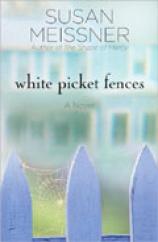White Picket Fences
Review
White Picket Fences
The disappearance of Bart Bachmann necessitates the placement of his daughter, Tally, into the home of her aunt and uncle, Amanda and Neil Janvier, and cousins Chase and Delcey. Though Tally’s father loves her, his own life is a kind of fleeting and shallow existence, and the Janviers represent the exact opposite of everything that is her father. They seem to live life under the ideas of responsibility, constancy and, above all, a focus on family. But Tally soon discovers that appearances can be deceiving when their secrets threaten to destroy everything that really matters to them.
Whether Tally’s abandonment is a temporary or permanent situation is unclear as Bart left without much explanation; he simply told his daughter he was leaving her with her grandmother for a while and without any phone number or forwarding address where he could be reached. He didn’t even give her a firm location of where he was going --- just somewhere in Poland --- and asked her not to contact anyone from where they used to live. The whole situation brings up uncomfortable questions about what exactly Bart has gotten himself into.
The sudden death of Tally’s grandmother leaves the teenager in a vulnerable situation, but luckily she has relatives who can take her in. She’s not so sure about what the Janviers think of her, however, as they’re quietly critical of her father and seem to look at her like she’s a potential troublemaker. Her multiple piercings and tattoo are things that they definitely frown upon, but they also seem to question the way in which she’s been raised. Tally has been warned that the arrangement could become permanent by the state, depending on whether or not Bart bothers to contact her soon.
Tally finds that Amanda and Neil are actually very nice people who lead a comfortable life to which she quickly becomes accustomed. Amanda in particular makes a big effort to make her feel at home, and though Neil and Delcey aren’t her favorites, Chase seems friendly and supportive enough and is close to her own age. Getting to know the Janviers helps Tally feel comfortable around them, but she begins to realize they have their own problems.
Neil spends more time hiding out in his woodshop than he does talking to his kids or his wife, and Amanda seems bothered by something going on behind the lines. While Delcey is constant in being her same irritating self, Chase seems to have something he’s struggling with. He hints at hiding some disturbing secret that begins to surface when the two work together on a school project. It’s something involving a fire that Chase survived when he was only four years old, though not everyone lived through it. His parents never, ever speak of the fire, so Chase has long assumed they prefer that he keep it bottled up. The strange circumstances surrounding the incident have haunted him, leaving him with a lingering fear of flames and terrible nightmares of a monster he calls “ghost.” More importantly, the fire has left him with questions --- ones his parents could help him with if they were willing to have a real heart-to-heart.
Chase and Tally’s sociology project helps them uncover even more Janvier family secrets. Their project is making a film about the Holocaust, and to do so, they speak to survivors they meet at a local nursing home. Josef Abramovicz and Eliasz Bliss are the focus of the interview, charming old friends who tell of their distressing experiences in Poland during the reign of Hitler. These men had been sent to Treblinka for defying the Nazis, and it turns out that Tally and Chase’s family members knew them.
WHITE PICKET FENCES is quite a challenging and interesting story about what lies behind the pretty pictures we like to show people of ourselves; it’s about how much you truly know each other and how poor communication can slowly destroy everything that you have. Tally isn’t the only person who learns a valuable lesson from this; in the end, Amanda, Neil and Chase learn much more about what family means. The fact that they somehow find a way to behave differently from what they’re used to is a credit to the commitments they’ve made and the power of love itself. Though it seems at first to be a side issue, one of the bigger focuses in the novel is the Holocaust victims. It adds greater dimension to the story and brings to light that the worst atrocities out there often help us see what is really important in life.
Reviewed by Melanie Smith on November 13, 2011










